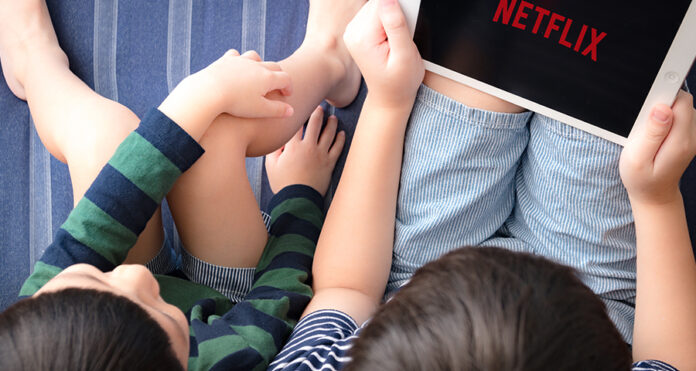Expert / 9 May, 2025 / My Baba
The launch of Netflix’s Adolescence has reignited considerations about how digital content material is shaping younger minds. The present places a highlight on the impression of extreme display screen time, elevating uncomfortable—however—vital questions for parents about what their youngsters are watching and the way it may have an effect on their psychological well being and behavior in the long term. To discover the impression of display screen time on youngsters extra deeply, we spoke with Steven Buchwald, a licensed psychological well being therapist and co-founder of Manhattan Mental Health. Buchwald shares his professional perception on what an excessive amount of display screen time can actually imply for kids right now — and what parents can do about it.
In an period the place smartphones and social media dominate, youngsters are extra related than ever, however at what value? Recent research have linked extreme display screen publicity to nervousness, melancholy, and developmental delays. Even extra regarding is the rise of the “red pill effect,” the place unfiltered on-line content material influences youngsters’s worldviews in methods they might not totally perceive.
“Parents often assume their child is just watching innocent content, but the reality is that many children are exposed to misinformation, toxic ideologies, and social pressures online. Without proper guidance, this can significantly impact their emotional and psychological development.”
Below, we discover the hidden risks of extreme display screen time and what parents can do to guard their youngsters.
The Unseen Psychological Toll of Excessive Screen Time
A rising physique of analysis means that prolonged display screen time impacts mind growth in youngsters and adolescents. The impression of display screen time on youngsters and fixed digital stimulation can result in:
- Reduced consideration spans – Studies present that frequent social media use rewires the mind for brief bursts of dopamine-driven content material, making it more durable for kids to focus on long-form studying or deep pondering.
- Increased nervousness and melancholy – Research from JAMA Pediatrics discovered that extreme display screen time is linked to greater charges of temper issues in teenagers. Social comparability, cyberbullying, and publicity to distressing content material contribute to those psychological well being points.
- Disrupted sleep patterns – The blue mild from screens interferes with melatonin manufacturing, resulting in poor sleep, which in flip impacts temper, focus, and general well-being.
“We see more young patients struggling with anxiety and self-esteem issues tied to excessive digital engagement. Many parents don’t realise just how much their child’s mental health is being shaped by the online world.”
The ‘Red Pill’ Effect Shapes a Child’s Perspective
The web’s algorithm-driven nature implies that as soon as a toddler engages with sure content material, they’re repeatedly uncovered to comparable materials. This can result in the “red pill effect,” the place youngsters unknowingly take up dangerous narratives, together with:
Toxic masculinity and excessive ideologies – Some on-line communities promote unhealthy concepts about gender roles, relationships, and self-worth.
Misinformation and conspiracy theories – Without crucial pondering expertise, youngsters could battle to distinguish between factual content material and manipulated narratives.
Unrealistic magnificence requirements and physique picture points – Social media filters and curated existence can distort a toddler’s self-perception, resulting in physique dysmorphia and vanity struggles.
“Many kids don’t seek out dangerous content, but they’re drawn into it through algorithms. A simple video on fitness can lead to extreme diet culture; a clip on self-improvement can spiral into toxic masculinity rhetoric. Parents need to be aware of what their child is watching.”
Social Skills and Real-World Interaction at Risk
While digital platforms allow on the spot communication, they can not exchange face-to-face interplay. Studies present that youngsters who spend extreme time on-line could battle with:
Reading social cues – In-person interactions educate youngsters easy methods to interpret physique language, tone, and feelings, expertise that can not be discovered via textual content or emojis.
Building sturdy relationships – Shallow digital friendships typically exchange significant, real-world connections, resulting in elevated loneliness.
Handling battle and emotional regulation – In-person disagreements require negotiation and compromise, whereas on-line conflicts typically lead to blocking or avoidance.
A report from The Independent highlights how elevated display screen time is linked to a decline in youngsters’s social expertise. Steven advises parents to encourage actions that promote real-world interactions, reminiscent of group sports activities, volunteering, or just having common household discussions.
The Impact of Social Media on Self-Worth
Social media platforms can have an particularly detrimental impact on youngsters’s vanity and physique picture. The curated, typically unrealistic portrayals of life can create emotions of inadequacy and nervousness in younger minds.
Influencers and Validation – Children evaluate themselves to influencers, basing their price on likes and shares.
FOMO (Fear of Missing Out) – Seeing others consistently engaged in thrilling actions could make kids really feel neglected or lonely.
The Pressure to Be Perfect – Social platforms push youngsters to current excellent lives, feeding insecurities and nervousness.
“Parents must be mindful of how their children perceive social media and encourage them to focus on their individual strengths rather than external approval.”
The Pressure of Online Peer Groups and Cyberbullying
While digital platforms provide an area for youngsters to attach with friends, they will additionally expose them to dangerous influences, together with cyberbullying and social exclusion.
The Rise of Cyberbullying – Harassment via messages or social media can severely impression self-worth and psychological well being.
Peer Pressure Online – Trends and viral challenges typically push kids to behave towards their higher judgment to slot in.
Impact on Mental Health – Victims of cyberbullying could undergo from long-term trauma, nervousness, and melancholy.
“Cyberbullying can be especially damaging because it’s not confined to school hours. Parents must help their children develop strategies to deal with bullying.”
How Parents Can Take Control
Managing a toddler’s display screen time in a digital age is difficult, however not unattainable. Here are some sensible methods to strike a steadiness:
- Set clear boundaries – Establish screen-free instances, reminiscent of throughout meals or earlier than bedtime.
- Encourage different actions – Introduce hobbies that don’t contain screens, reminiscent of studying, sports activities, or arts and crafts.
- Monitor and talk about on-line content material – Instead of banning sure platforms outright, have open discussions concerning the content material your baby consumes.
- Use parental controls properly – Tools like display screen closing dates and content material filters may also help, however they need to be paired with training about digital literacy.
- Lead by instance – Children mimic grownup behaviour, so being conscious of your individual display screen habits units a strong precedent.
- Schedule common digital detox days – Designate a full day or half-day every week the place the entire household takes a break from screens. Use the time for shared experiences that construct stronger emotional connections.
- Stay concerned and knowledgeable – Keep up with the platforms, video games, and tendencies your baby is partaking with.
- Join parenting boards, learn professional blogs, and don’t hesitate to ask your baby to show you about their favorite app or recreation. This opens the door for higher communication.
“The goal isn’t to eliminate screens entirely, but to create a healthier relationship with technology. Parents who engage in conversations, set boundaries, and educate their children on media literacy will help them navigate the digital world safely.”
Parents should arm themselves when fostering their baby’s emotional well-being in a technology-driven world. By staying knowledgeable and engaged, you’ll be able to assist your baby develop a wholesome steadiness between on-line and offline life.
About Steven Buchwald
Steven Buchwald is a licensed psychological well being therapist and co-founder of Manhattan Mental Health, specialising in adolescent psychology and digital wellness. With years of expertise serving to households navigate screen-time challenges, he supplies professional steerage on balancing expertise use with psychological well-being.
About Manhattan Mental Health
Manhattan Mental Health is a number one psychological well being follow devoted to offering accessible, high-quality remedy in New York. Their group of consultants helps people and households navigate modern-day challenges, together with digital wellness, nervousness, and social growth.
READ NEXT
Where To Travel This Summer (And Keep The Kids Happy Too)
27 Pairs Of Summer Sandals For Kids



